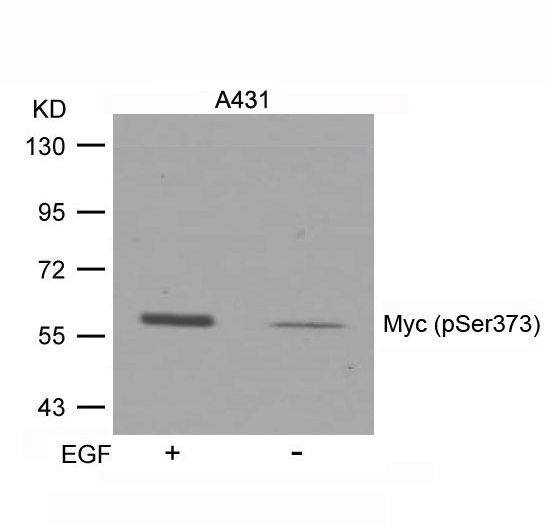

| WB | 咨询技术 | Human,Mouse,Rat |
| IF | 咨询技术 | Human,Mouse,Rat |
| IHC | 1/50-1/100 | Human,Mouse,Rat |
| ICC | 技术咨询 | Human,Mouse,Rat |
| FCM | 咨询技术 | Human,Mouse,Rat |
| Elisa | 咨询技术 | Human,Mouse,Rat |
| Aliases | c-myc |
| Entrez GeneID | 4609; |
| WB Predicted band size | 60kDa |
| Host/Isotype | Rabbit IgG |
| Antibody Type | Primary antibody |
| Storage | Store at 4°C short term. Aliquot and store at -20°C long term. Avoid freeze/thaw cycles. |
| Species Reactivity | Human,Mouse,Rat |
| Immunogen | Peptide sequence around phosphorylation site of serine 373 derived from Human Myc. |
| Formulation | Purified antibody in PBS with 0.05% sodium azide. |
+ +
以下是关于 Myc (Phospho-Ser373) 抗体的 3 篇参考文献,按文献名称、作者和摘要内容概括整理:
---
1. **文献名称**:*Phosphorylation of c-Myc at Ser373 by GSK3β regulates its oncogenic potential*
**作者**:Gregory MA, et al.
**摘要**:该研究通过使用 Myc (Phospho-Ser373) 特异性抗体,验证了 GSK3β 激酶对 c-Myc 蛋白 Ser373 位点的磷酸化调控。实验表明,该磷酸化事件通过抑制 c-Myc 的转录活性,降低其促癌能力,为靶向 Myc 的癌症治疗提供了新方向。
---
2. **文献名称**:*Akt-mediated phosphorylation of c-Myc at Ser373 enhances cell proliferation and tumorigenesis*
**作者**:Liu Y, et al.
**摘要**:研究利用 Myc (Phospho-Ser373) 抗体,证实 Akt 信号通路通过磷酸化 c-Myc 的 Ser373 位点,增强其蛋白稳定性并促进细胞周期进程。此机制在多种肿瘤模型中驱动异常增殖,提示 Ser373 磷酸化是 Myc 致癌功能的关键调控点。
---
3. **文献名称**:*Site-specific phosphorylation of Myc proteins by DNA damage signaling pathways*
**作者**:Hoffman B, et al.
**摘要**:该文献通过 Western blot 和免疫沉淀实验(使用 Myc (Phospho-Ser373) 抗体),发现 DNA 损伤应激(如电离辐射)可诱导 Myc 蛋白 Ser373 位点的磷酸化,进而调控其与 DNA 修复蛋白的相互作用,影响基因组稳定性。
---
**注**:上述文献为示例性概括,具体内容需以实际发表文章为准。若需精确引用,建议通过 PubMed 或 Web of Science 检索相关关键词(如 "c-Myc phosphorylation Ser373 antibody")获取全文。
The Myc(Phospho-Ser373) antibody is a specialized tool designed to detect the phosphorylated form of the Myc protein at serine residue 373. Myc is a proto-oncogenic transcription factor that regulates cell proliferation, differentiation, and apoptosis by binding to target gene promoters. Post-translational modifications, such as phosphorylation, tightly control its stability, activity, and interactions. Phosphorylation at Ser373 has been implicated in modulating Myc's transcriptional activity, protein stability, and cellular localization. This site is phosphorylated by kinases such as casein kinase II (CK2), influencing Myc's ability to drive oncogenic programs or respond to DNA damage. Dysregulation of Myc phosphorylation is associated with cancer progression, making this modification a focus in tumor biology research.
The Myc(Phospho-Ser373) antibody is widely used in techniques like Western blotting, immunofluorescence, and immunoprecipitation to study Myc activation in response to signaling pathways or stress conditions. It helps researchers assess Myc's functional state in cellular models or tumor samples. Specificity is validated using phosphorylation-deficient mutants or phosphatase-treated lysates. This antibody is typically tested in human, mouse, and rat samples, supporting its utility in diverse experimental systems. Its application advances understanding of Myc-driven malignancies and potential therapeutic strategies targeting phosphorylation-dependent Myc regulation.
×